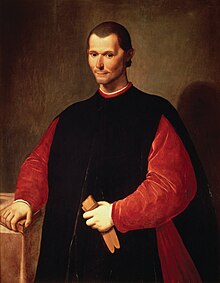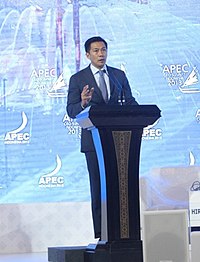
Back Leierskap Afrikaans قيادة Arabic Lideralgu AST Rəhbərlik Azerbaijani নেতৃত্ব Bengali/Bangla Lideratge Catalan ڕێبەرایەتی CKB Vůdcovství Czech Menschenführung German Ηγεσία Greek
| Part of a series on |
| Psychology |
|---|


Leadership, both as a research area and as a practical skill, encompasses the ability of an individual, group, or organization to "lead", influence, or guide other individuals, teams, or entire organizations.
"Leadership" is a contested term.[1] Specialist literature debates various viewpoints on the concept, sometimes contrasting Eastern and Western approaches to leadership, and also (within the West) North American versus European approaches.[2]
Some U.S. academic environments define leadership as "a process of social influence in which a person can enlist the aid and support of others in the accomplishment of a common and ethical task".[3][page needed][4][need quotation to verify]—in other words, as an influential power-relationship in which the power of one party (the "leader") promotes movement/change in others (the "followers").[5] Some have challenged the more traditional managerial views of leadership (which portray leadership as something possessed or owned by one individual due to their role or authority), and instead advocate the complex nature of leadership which is found at all levels of institutions, both within formal[6] and informal roles.[7][page needed][need quotation to verify]
Studies of leadership have produced theories involving (for example) traits,[8] situational interaction,[9] function, behavior,[10] power, vision[11] and values,[12][need quotation to verify] charisma, and intelligence,[13] among others.[4]
- ^
- Grint, Keith (2005). Leadership: Limits and Possibilities. London: Palgrave. ISBN 9780333963876.
Moral leadership is not the way to secure democracy, morality and justice because morality, like power and leadership is an essentially contested concept....
[dead link] - Western, Simon (2013). Leadership: A critical text. London: Sage. p. 26. ISBN 9781446294208.
Leadership is a contested term with multiple meanings and diverse practical applications.
- Grint, Keith (2005). Leadership: Limits and Possibilities. London: Palgrave. ISBN 9780333963876.
- ^ Grosset, Serge (1970). Management: European and American Styles. Belmont, California: Wadsworth Publishing Company. Retrieved 20 August 2023.
- ^ Chemers, M. (1997). An integrative theory of leadership. Lawrence Erlbaum Associates, Publishers. ISBN 978-0-8058-2679-1.
- ^ a b Chin, Roger (2015). "Examining teamwork and leadership in the fields of public administration, leadership, and management". Team Performance Management. 21 (3/4): 199–216. doi:10.1108/TPM-07-2014-0037.
- ^ Northouse, Peter G. (2018). Leadership: Theory and Practice (8 ed.). California: Sage Publication. ISBN 9781506362298.
...some define leadership in terms of the power relationship that exists between leaders and followers.
- ^ Washington, Marvin; Boal, Kimberly; Davis, John (18 February 2020). "Institutional Leadership: past, present, and future". In Greenwood, Royston; Oliver, Christine; Lawrence, Thomas B; Meyer, Renate E. (eds.). The Sage Handbook of Organizational Institutionalism. SAGE Publications, Limited. pp. 719–733. ISBN 9781529712117.
- ^ Goleman, D.; Boyatzis, R.E.; McKee, A. (2003). The New Leaders: Transforming the art of leadership. London: Sphere. Sphere. ISBN 9780751533811.
- ^ Kirkpatrick, Shelley A.; Locke, Edwin A. (1991). "Leadership: Do traits matter?" (PDF). Academy of Management Executive. 5 (2). Archived from the original (PDF) on 2010-06-27.
- ^
Seyranian, Viviane (2010). "Interactionist Theories of Leadership". In Levine, John M; Hogg, Michael A. (eds.). Encyclopedia of Group Processes and Intergroup Relations. Sage reference. Vol. 1. Los Angeles: SAGE. p. 458. ISBN 9781412942089. Retrieved 20 August 2023.
Interactionist leadership scholars also have argued that trait-based or situational accounts of leadership ignore how a leader can affect a situation or how a situation may influence leaders. [...] Interactionist theories of leadership link person–situation variables in a network of multidirectional relationships that attempt to capture the evolving nature of leadership.
- ^ Goldsmith, Marshall (2016). Dekel, Gil (ed.). "Leaders Make Values Visible". Design Toolbox.
- ^ Saffold, Guy (2005). "Leadership Through Vision". Strategic Planning: Leadership through Vision. Nairobi: Evangel Publishing House. p. 137. ISBN 9789966201225. Retrieved 11 November 2021.
...leadership is about the future; and the future is about vision.
- ^ Richards, Dick; Engel, Sarah (2005) [1986]. "After the vision: suggestions to corporate visionaries and vision champions". In Adams, John D. (ed.). Transforming Leadership (2nd ed.). New York: Cosimo. p. 206. ISBN 9781596053656. Retrieved 11 November 2021.
- ^ Riggio, Ronald E.; Murphy, Susan Elaine; Pirozzolo, Francis J., eds. (2001). Multiple Intelligences and Leadership. Organization and Management Series. Mahwah, New Jersey: Lawrence Erlbaum Associates. ISBN 9781135662431. Retrieved 20 August 2023.
© MMXXIII Rich X Search. We shall prevail. All rights reserved. Rich X Search